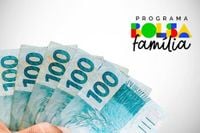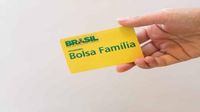Payments for Bolsa Família in May 2025 are set to begin on May 19, with a staggered schedule based on the last digit of beneficiaries' Social Identification Numbers (NIS). Over 20 million Brazilian families eagerly await these payments, which are crucial for combatting poverty and ensuring food security.
The Ministry of Development and Social Assistance, Family and Combating Hunger (MDS) announced that the payments will continue until May 30, 2025. The program, renowned for its role in reducing poverty, has made adjustments to benefit amounts, aiming to better meet the needs of its recipients.
Under the new payment structure, families will receive a minimum of R$ 600, with additional benefits based on family composition. Specifically, the Benefit of Citizenship Income (BRC) provides R$ 142 per person, while the Complementary Benefit (BCO) ensures families receive at least R$ 600 total, even if the sum of their BRC is lower.
The staggered payment schedule for May is as follows: NIS ending in 1 will receive payments on May 19, followed by NIS ending in 2 on May 20, and so forth, concluding with NIS ending in 0 on May 30. This system is designed to minimize crowding at banks and ensure a smoother distribution process.
In addition to the payment schedule, the MDS has reiterated the importance of compliance with program requirements. Families must ensure that children and adolescents aged 4 to 17 attend school regularly, pregnant women receive prenatal care, and children up to seven years old have their nutritional status monitored. Failure to meet these requirements could lead to temporary suspensions or cancellations of benefits.
One significant change for May 2025 is the end of the Extraordinary Transition Benefit (BET), which was designed to ensure that no one received less than they did under the previous Auxílio Brasil program. This marks a pivotal moment as the Bolsa Família program transitions fully into its new structure.
Families eligible for Bolsa Família must have a per capita income of up to R$ 218 and be registered in the Cadastro Único (CadÚnico). The program aims to reach those in poverty or extreme poverty, with a focus on supporting vulnerable households.
The Bolsa Família program consists of various benefits tailored to meet the diverse needs of its recipients. These include the Early Childhood Benefit (BPI), which offers R$ 150 for each child under six years old, and the Variable Family Benefit (BVF), providing R$ 50 for pregnant women and young people aged 7 to 17. Furthermore, the Variable Family Nutriz Benefit (BVN) grants an additional R$ 50 for each baby up to six months old, paid for six months.
In 2025, the average payout per family is expected to be around R$ 668, reflecting the adjustments made to benefit amounts. This increase is crucial for the 20.4 million families that rely on these funds for their daily needs.
The digital transformation of Bolsa Família has also played a significant role in facilitating access to benefits. The Caixa Tem app allows beneficiaries to manage their payments, check balances, and conduct transactions with ease. This modernization has made it simpler for families to receive and use their funds, reducing the need for frequent trips to banks.
Moreover, the government has emphasized the importance of maintaining updated records in the CadÚnico, requiring families to update their information every two years or whenever there are significant changes, such as the birth of a child or changes in income. Failure to keep records current may result in the suspension of benefits.
The Bolsa Família program not only addresses immediate financial needs but also promotes long-term development through its conditionalities. By requiring families to meet health and education benchmarks, the program encourages greater school attendance and healthcare access among its beneficiaries.
In 2025, the MDS has intensified monitoring efforts, with teams available in social assistance centers to guide families and help them avoid penalties. This proactive approach aims to enhance compliance with program requirements, ensuring that families can continue to receive the assistance they need.
The impact of Bolsa Família on poverty reduction is substantial. In 2024 alone, the program transferred over R$ 168.3 billion, averaging R$ 14 billion monthly. The financial support not only alleviates poverty but also stimulates local economies, as funds are typically spent in local markets, benefiting small businesses.
Additionally, the program has contributed to increased school attendance and improved health outcomes. Reports indicate that children from families enrolled in Bolsa Família are more likely to attend school regularly and arrive better nourished and prepared to learn.
As Brazil continues to face economic challenges, Bolsa Família remains a vital lifeline for millions. The adjustments to the program reflect a commitment to supporting vulnerable populations while adapting to changing circumstances.
In summary, the payment schedule for Bolsa Família in May 2025 is set to provide essential support to families across Brazil. With a focus on compliance and modernization, the program aims to enhance the lives of those it serves while continuing to combat poverty effectively.





